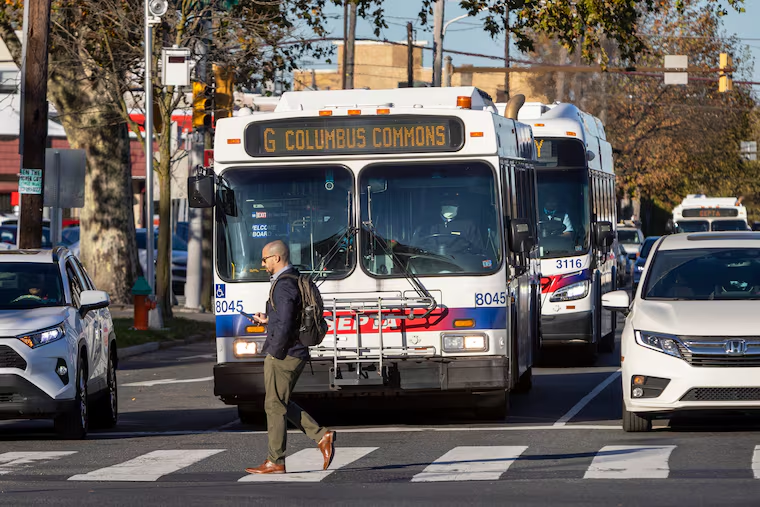City Council is more concerned with cars than public transit | Editorial
Until Council starts treating the city’s public transit troubles with urgency and consistency, riders are unlikely to get the help they need.

It’s no secret that public transportation in Philadelphia has taken a big dip during the pandemic.
Ridership has been slow to come back on the Broad Street and Market-Frankford lines, and the city’s buses, which face additional hurdles due to crowded and often chaotic streets, have also been devastated by an ongoing operator shortage.
As federal COVID-19 relief funds that have helped keep the city’s transit system going run low, the Southeastern Pennsylvania Transportation Authority — which is responsible for most public transit in the city — could use a helping hand from city government.
What it is likely to get instead, during January’s scheduled hearings on SEPTA’s proposed changes to its bus network, will be grandstanding and unproductive meddling from a City Council that has rarely made quality public transportation a priority.
Philadelphia, and the hundreds of thousands of residents and visitors who use the service every day, deserve better.
» READ MORE: Why your bus is late — and what SEPTA is trying to do to fix it
At stake is Bus Revolution, SEPTA’s plan to improve service and turn around its sagging bus ridership numbers. For the first time in 70 years, planners have redrawn bus routes from scratch, intending to provide more speed and frequency. Passengers have long cited the service’s unreliable nature and slow speeds as their top concerns. Improving frequency and reliability is a proven way to win back ridership — some North Jersey bus routes saw increases of 78% after tackling reliability issues.
SEPTA’s efforts are not without critics. Some riders and operators are concerned about losing routes, with Roxborough and Manayunk residents particularly upset about proposals that will require transfers — either at Wissahickon Transportation Center or 30th Street Station — in order to complete many journeys. Councilmembers, responding to these complaints, have alleged that Bus Revolution is a cover for service cuts.
Fortunately, that does not appear to be the case. An analysis prepared for Transit Forward Philadelphia, an advocacy group, found that most city neighborhoods are gaining bus frequency and coverage, rather than losing it.
SEPTA was not given funding to increase service as a part of Bus Revolution, forcing it to cancel routes in areas with low ridership to increase frequency elsewhere, but those cancellations are overwhelmingly located in suburban areas. Most city neighborhoods, including much of Roxborough, will benefit from the reallocation of resources.
The transportation authority is actively soliciting feedback on its draft network. SEPTA planners have acknowledged that some proposed routes may need to change. While making revisions based on feedback from residents is an essential part of the process, it would be wrong to tell the agency to start over, a proposal from Council Majority Leader Curtis Jones. Putting off this redesign is the kind of decision that could lead to real service cuts in the future.
Council seems to have a keen ability when it comes to arriving at the end of a process in order to ensure a plan is bungled. Its involvement in Bus Revolution has the potential to become yet another example, as councilmembers — who by their own admission rarely ride SEPTA and almost never discuss the system’s trials and travails in hearings — appoint themselves arbiters of a critical and desperately needed redesign process.
» READ MORE: The city’s Washington Avenue head-fake reveals the sham of ‘community engagement’ | Editorial
Unlike the city’s motorists, whose challenges councilmembers often address, the nearly 500,000 weekday bus riders, 70,000 trolley riders, 180,000 Market-Frankford Line riders, and 120,000 Broad Street Line riders get very little attention from a body whose perks include a city-owned SUV and, often, a driver.
Councilmembers have been known to drastically rezone entire commercial corridors due to parking complaints, but when it comes to the well-known woes of the city’s transit system, they are typically silent. If an illegally parked car blocks dozens of Philadelphians on a bus or trolley from getting to work on time, Council is more likely to intervene to help the scofflaw avoid tickets than it is to help transit riders get where they need to go.
Given this background, it is unlikely that Council’s belated hearings will accomplish anything useful. A better approach would have been getting involved with Bus Revolution from the start, learning the legitimate reasons why the redesign is happening, and working with SEPTA on solutions such as dedicated bus lanes, bus prioritization, and other changes that can help operators and riders successfully navigate the city.
Sadly, according to SEPTA planners, these issues were considered too politically charged. That’s code for “councilmembers won’t support it.”
Until Council starts treating the city’s public transit troubles with the same urgency and consistency it grants to parking problems and honorary resolutions, the city’s riders are unlikely to get the help they need.